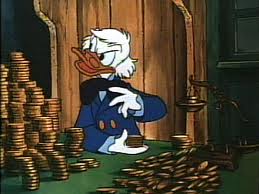 It’s nice to see science magazines writing about money 🙂
It’s nice to see science magazines writing about money 🙂
This time , it’s trying to find a link between wealth and (a lack of) ethics.
This is not a new notion, just check out Charles Dickens’ “A Christmas Carol” and it’s offshoot – and my favorite cartoon character – Scrooge McDuck and you need look no further.
But, I think that these scientists – and authors and cartoonists – miss the point:
You do not have to be unethical to make money …
… and, I think that it actually harms your chances as people often can spot unethical tendencies and will take that (correctly) as a sign that they cannot trust you.
However, if the study is correct, I think one explanation may simply be that wealthy people have been exposed to more opportunities to make the “should I be ethical or unethical in this situation?” decision.
More exposure simply means more unethical behavior evidenced.
For example, working on a production line may not produce wealth …
… but, it also may not produce many opportunities to take unethical action during the 8 hours a day that you are at work.
[AJC: although, you may have plenty of opportunity to indulge in unethical behavior after hours if that is your bent]
However, being in business or running around making real-estate investments may give you plenty of extra opportunities to (a) become wealthy and (b) exhibit unethical behavior both during and after hours, thereby giving you twice the exposure to both potential outcomes.
So, I think it is a case of increased exposure rather than cause and effect …
What do you think? Do you need to be unethical to make money? If so, is that a ‘cost’ you are willing to carry?





People can be eithical or unethical regardless of the state of their personal finances – the executive who loots the company pension plan is no different from the property investor who cheats on taxes or the truck driver who helps himself to a few items from a shipment or the barmaid who pockets more than the tips.
I’ve always taken the view that your reputation is a coin that you can only spend once and it’s just not worth doing so. There are plenty of legitimate ways to achieve financial independance without sacrificing your integrity.
Adrian
Having thought about it a bit more, I’d flip the question around – is it unethical for someone to be “poor” when they have the means to do better for themselves? I’m thinking of people who choose not to live below their means or who choose not to work and end up as burdens on current and future tax payers.
Cheers
traineeinvestor
@ traineeinvestor – hmmm …. is it unethical not to strive to your full potential? To be an athlete with talent, but give up because you don’t like the training? To be in college but not graduate at the top (hence get the best post-college opportunities) because you’d rather enjoy college life?
Def. food for thought!
Hi Adrian
It’s not so much “not striving” as “not striving and imposing a burden on others as a result”.
Cheers
traineeinvestor
I think it a matter of scale. Bernie Madoff’s theft was so vast it dwarfs all the people stealing from the supplies closet. And pepple like to see wealth people “brought down to size”.
Maybe there is a belief that wealth is often undeserved and unearned (look at parts of the 99% movement). After all, why isn’t everyone rich?
Deciding not to live up to your potential is not unethical, even if your parents may think otherwise. But you may be shortchanging yourself. Still, there is something to be said for enjoying lazy-day afternoons.